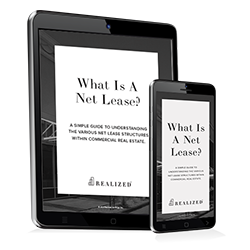What Is Political Risk and How Can I Measure It?

At Realized Holdings, we write about risk on a frequent basis. There are all kinds of risks that impact investments, such as business risk, credit risk, general market risk, and systematic risk.
What Is a Step-Up Lease?

A step-up lease is a lease agreement that comes with increases embedded into it. Such provisions are sometimes referred to as escalator clauses. From the landlord's perspective, it makes sense, particularly when the agreement term is lengthy and rental rates are volatile. A step-up can accompany a gross or net lease and may trigger a specific dollar amount, percentage, or indexed increase. The tenant may also benefit if the addition of a step-up provision facilitates their ability to acquire a lease of the preferred length. Plus, it allows for longer-term planning.
Ways To Evaluate a Rental Property Investment

Let’s say you’ve come across a potential investment, one that involves the purchase of a rental property. And let’s also say that the individual making you aware of this investment tells you it’s a sure thing, offering great returns with little risk. After all, it’s real estate, right? And real estate is supposed to be a solid investment.
What Is After Repair Value (ARV), and How Is It Calculated?
%20and%20how%20is%20it%20calculated%3F-1282631484.jpg?width=750&height=392&name=What%20is%20after%20repair%20value%20(ARV)%20and%20how%20is%20it%20calculated%3F-1282631484.jpg)
The After Repair Value (ARV) is the estimated value of a property after repairs, remodeling, or improvements are completed. Determining the ARV of a property is one component in deciding whether it’s a good investment. If the potential acquisition has a significantly greater ARV (customarily at least 25 percent) than the cost of buying, holding, repairing, and selling it, then it makes sense.
What Is Longevity Risk and How Can You Mitigate It?

Every so often, the media will announce that Americans are living longer than ever before. It’s true that recent headlines report shorter life spans because of COVID-19. But over the very long term (i.e., a 50-100 year big picture), people are living longer, thanks to improvements in medicines, medical technologies, and lifestyle choices.
What Does a Property Manager Do?

Investing in real estate is an effective method of building wealth and expanding your estate. Despite the many benefits derived from real estate investments, maintaining the property requires ample amounts of time and attention. If you invest in a rental property, you may be tasked with searching for the right tenants, collecting rent payments, and making sure that the building is properly maintained. If you don't have the time to manage your own property, you could hire a property manager to take care of these tasks for you.
How Are Bonds Affected by Inflation Risk?

If you’ve been paying attention to recent business and financial headlines recently, you know that we’re living in inflationary times. The Bureau of Labor Statistics releases a monthly Consumer Price Index (CPI), an indicator of inflation. The April 2022 numbers showed that the index increased by 8.5% from the year before. In other words, people are paying 8.5% more these days for baskets of consumer goods and services.
What Is Foreign Investment Risk?

When Russia invaded Ukraine on February 24, 2022, the United States, European Union, and other countries announced sanctions on Russia. These sanctions ranged from banning investments in and exports to Russia, sanctioning the Russian central bank and freezing assets of high-ranking political officials. This, in turn, drove Russia to impose its own economic sanctions and measures on foreign investors with assets and capital in the country. All of this, in conjunction with Russia’s shuttered stock market and the ruble’s collapse, has harmed foreign investors with exposure to Russian assets.
What is Concentration Risk and How Can You Mitigate It?

Putting all your eggs in one basket speaks to the essence of concentration risk.
What Is Regulatory Risk and How Can I Mitigate It?

Changes in federal, state, or local regulations by governing bodies can negatively impact many sectors of business, financial securities, or the stock market. These changes could lead to higher costs of doing business, unfavorable tax environments, or even unhinge an industry’s entire business model.


